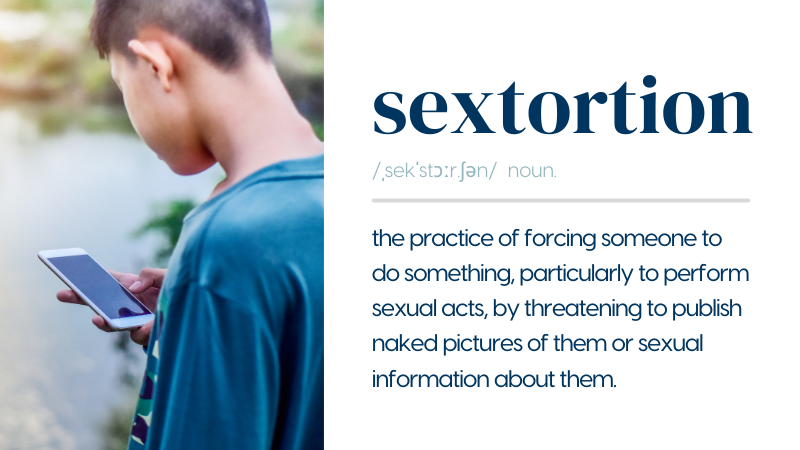Sextortion is a rising concern in every community and every child who has a device is at risk. Using the grooming process, predators find children they meet in person or online and build a relationship with them.
After gaining their trust with friendship and filling needs, they will ask for photos. Many predators pretend to be children of similar ages. They may send revealing images of other children, under false pretenses that it is them. Over time, the predator will groom the child until he/she does send a compromising image/video.
They then threaten the child to send more. They may threaten them stating they will send it to their parents, pastor, teachers, or post it to their social media. They may threaten their lives or the lives of their family. This keeps the child feeling they cannot seek help.
The predator then controls them to send increasingly sexual content. They may have the child abuse younger children in images/videos.
Signs of sextortion: Major change in behavior, hiding phone, missing messages from texts/apps, jumping in reaction to someone coming, new devices/cameras, etc.

June 2022 – The National Child Protection Task Force hosted a screening of Sextortion: the hidden pandemic featuring expert panelists Jim Cole, Jon Rouse, Jessica Smith, and filmmaker Stephen Peek.
The Rising Danger of Online Sextortion Against Minors
In an alarming trend, the FBI's Memphis Field Office has released a notice alerting that there has been a significant increase in sextortion cases involving minors. Between October 2021 and March 2022, law enforcement across the United States has seen a surge in reports of young victims being coerced into sending explicit images online, only to be blackmailed for money afterward.
- Alarming Increase: There's been a noticeable spike in sextortion incidents, with predators increasingly targeting minors through social media and online gaming platforms. These offenders often pose as peers to initiate contact.
- Demographics: The primary targets have been boys aged 14 to 17, although the threat extends to all minors online. Victims are manipulated into sending explicit photos and then extorted for money to prevent the public release of these images.
- Consequences: The psychological impact on victims is profound, leading to severe emotional distress. Tragically, the FBI notes that these situations have resulted in multiple suicides each year.
- Prevention and Response: The FBI emphasizes the importance of open communication between parents and children about online safety. They urge victims of sextortion to report the incidents to law enforcement immediately, reassuring that the focus is on protecting and helping the victim rather than pursuing punitive actions against them for any explicit images sent under duress.
The FBI encourages anyone who believes they or someone they know is a victim of sextortion to contact the FBI or local law enforcement immediately. It's crucial to save any correspondence with the offender to aid in the investigation.
Together, we can combat this disturbing trend and safeguard our children's well-being in the digital age.







